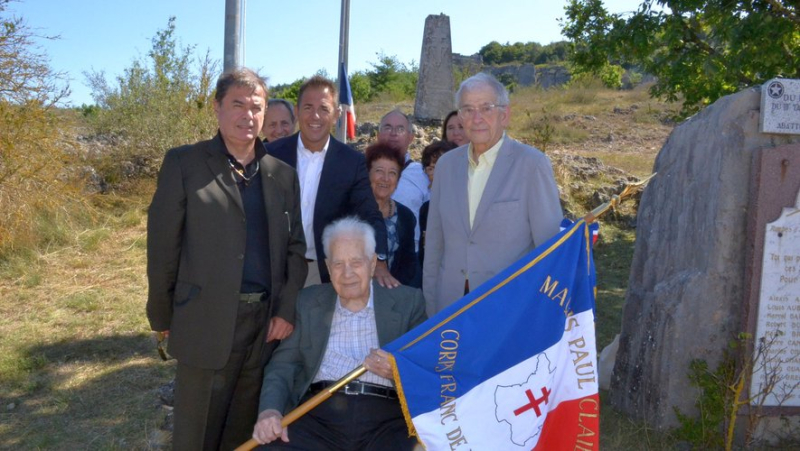Raphaël Garcia, centenarian and last survivor of the Paul-Clé maquis in South Aveyron: “We handed the Germans over to the police”

Raphaël Garcia commémore chaque année le maquis à la Pezade. Midi libre – J.-M. C.
Raphaël Garcia is present every year at La Pezade for the ceremony in memory of the 23 resistance fighters killed on August 22, 1944, the day Saint-Affrique was liberated, under German bullets, and of Richard Hoy, a US Air Force pilot who was shot down.
Raphaël Garcia, how do you feel every August 22 at La Pezade?
I am very lucky. Because of all those I knew in the Paul Clé resistance, only I remain. There are some who have received the medal. I have done quite a few things and I have never received a medal. From the maquis, I went to Germany. I wasn't in a place where people were seen hiding.
Why did you join the maquis??
I had to go to the youth work camps. But since I didn't want to go work for the Germans, I went into the maquis. I was put on a farm in Bennac, near Rebourguil, with some very nice people. They took me in as their son. I worked like them. I didn't come to eat and do nothing. I didn't feel disoriented. In Hérault, in Pouget, where I was born, there were vines and we worked them. In Bennac, they had a vineyard, I pruned it. Their name was Solier. It was 1944. They never forced me to work.
What actions did you participate in?
We liberated Saint-Affrique (on August 20, 1944 after the surrender of the occupying troops, Editor's note). The Germans were staying in a high school (Saint-Gabriel, Editor's note). We took them prisoner and handed them over to the police. At one point, almost at the end, the gendarmes from Saint-Affrique came with us into the maquis. We knew them. During the funeral of the 23 maquisards from La Pezade in Saint-Affrique, we guarded the entrances to the town. We had posted three or four of us at each entrance. Now we realize. If the Germans had arrived with two or three tanks, what could we have done? We only had machine guns.
After the battle of Pezade, what did you do?
From there, we went to Montpellier in an old green bus. We picked up all the guys from the maquis who were on the road. We checked them. We liberated Montpellier. From Montpellier, we went to Germany in buses and trucks. The French troops from Algeria had landed (the landing in Provence on August 15, 1944, Editor's note) and they had done a sweep, as they say. We were automatically integrated. I arrived in Germany without having fired a shot. In Germany, the first thing was to find somewhere to live. Afterwards, they had us searched because there were Germans who were hiding and there were repentant ones. I stayed in Germany for a month. A colonel wanted me to go back down with him to Nîmes and he had to go I don't know where. He sent me to Montpellier. From Montpellier, I went back to Germany. I had to see everything, listen to everything and keep quiet. I then returned home to Pouget. I became a prison guard in Angers and ended up in Toulouse until retirement.
What memories do you have of the maquis?
I have character. At 20, I didn't let people walk all over me. The right, the right above all. You had to walk straight. In the maquis, I had good and bad times. One day, a colleague, while showing how to handle a cylinder revolver, killed a colleague. Stupid things that shouldn't happen.
What messages should we send to future generations?
I seek friendship between everyone. That we all get along together. That we can go to Germany, to America, with an identity card and not need lots of papers. That's all. Why would a big country want to order a smaller one? I also hope that young people do their military service.
I subscribe to read the rest




